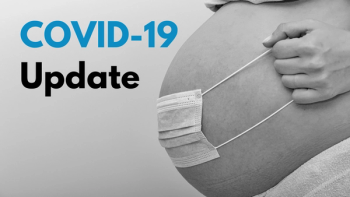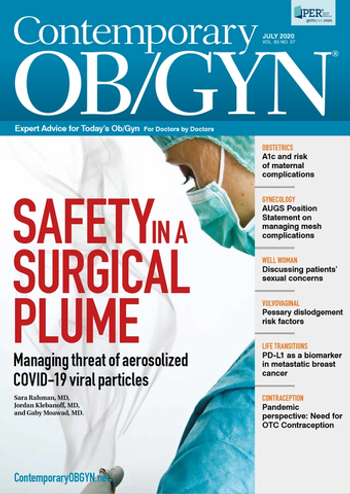
This clinical consensus statement on vaginal energy-based devices (EBDs) reflects statements drafted by content experts from the American Urogynecologic Society’s (AUGS) EBD writing group.

This clinical consensus statement on vaginal energy-based devices (EBDs) reflects statements drafted by content experts from the American Urogynecologic Society’s (AUGS) EBD writing group.

The lack of data on the possible connection between race and breast cancer prognosis is what led a group of Mount Sinai researchers to conduct this new multicenter, cross-sectional study.

In this month's issue, Contemporary OB/GYN Editor-in-Chief Dr. Catherine Y. Spong talks about the ways in which women's health research has and continues to be marginalized. Addressing these inequalities, Dr. Spong says, demands a change of culture led by committed and accountable leadership.

This month’s issue takes on the pervasive problem of implicit bias and systemic racism in health care.

The data below is a reflection of data collected weekly by the Centers for Disease Control and Prevention (CDC). The cases reported are only confirmed cases with laboratory evidence of SARS-CoV-2 infection.

“In the past 55 years since I became a physician, progress has been made but we still have so much more to do and a long way to go.”

Senior Editor Angie DeRosa and Associate Editor Lindsey Carr sat down with Drs. Vanessa Rogers and Shawna Nesbitt to discuss racism and unconscious bias in ob/gyn practice.

Here’s the latest data, updated on July 31:

We want to hear from you!

A literature review published in Pediatrics analyzed whether the practice of immunizations during pregnancy influence other early health outcomes.

A new study in the New England Journal of Medicine investigated the joint effect of gestational age and Apgar scores on the risks of neonatal death.

A study from the Long Island Breast Cancer Study Project (LIBCSP) investigated the association between menopausal hormone therapy (MHT) and mortality outcomes among breast cancer survivors.

New research shows that, when seeking treatment for cancer-related fatigue, breast cancer survivors underutilize recommendations.

A new report in Pediatrics investigated whether black children were likely to have more complications and greater mortality following surgery than their white peers.

This episode of Pap Talk by Contemporary OB/GYN features an interview with Dr. Washington Hill, Maternal-Fetal Medicine Specialist in Sarasota, Fla.

The U.S. government had entered into an agreement with Pfizer and BioNTech to acquire the first 100 million doses of a potential COVID-19 vaccine.

Maternal-Fetal Medicine Specialist Dr. Washington Hill shares his perspective with Senior Editor Angie DeRosa on the existence and impact of structural racism in America's healthcare system.

The American Academy of Pediatrics has released new information to improve long-acting reversible contraception (LARC) access for teenagers.

This Thursday, July 30, 2020 at 6 p.m. EDT, join us for a 1-hour live webinar as experts in infectious disease, virology, and vaccinology break down the top vaccine candidates, key findings from the latest clinical trials, and discuss ways to overcome the logistical hurdles of a vaccine rollout amid a global pandemic.

A new study from Diabetologia found that adults with type 2 diabetes with extreme sleep duration may be at a higher risk of death than adults without type 2 diabetes.

Maternal-Fetal Medicine Specialist Dr. Washington Hill shares his perspective with Senior Editor Angie DeRosa on the ob/gyn's role in shaping racial equity in their practice.

Postmenopausal women who breastfed for at least 6 months cumulatively have a significantly lower incidence of subclinical atherosclerosis compared to postmenopausal women who breastfeed for a shorter duration, according to a cross-sectional study in the journal Gynecological Endocrinology.

The study found that both patient- and treatment-related factors contributed to noncompliance.

The study in the Journal of Clinical Oncology is a follow-up to a study conducted by the same authors to evaluate if pregnancy is safe in breast cancer patients who have hormone-sensitive breast cancer.

Here’s the latest data, updated on July 23:

Many of the goals mentioned in the plan intersect with the mission of the NIH Office of Research on Women’s Health (ORWH).

The results of this study allowed researchers to identify the onset mechanism of recurrent pregnancy loss (RPL), especially in some cases that would have otherwise remained unexplained.

A new study from the National Institutes of Health (NIH) may shed light on why the virus has rarely been found in fetuses and newborns of mothers infected with COVID-19.

Did you know that up to 75% of medical residents develop burnout during their training period, with nearly 30% developing clinical symptoms of depression?

According to a new study in the American Journal of Health-System Pharmacy, chemotherapy stewardship programs may result in cost savings to both patient and health systems.